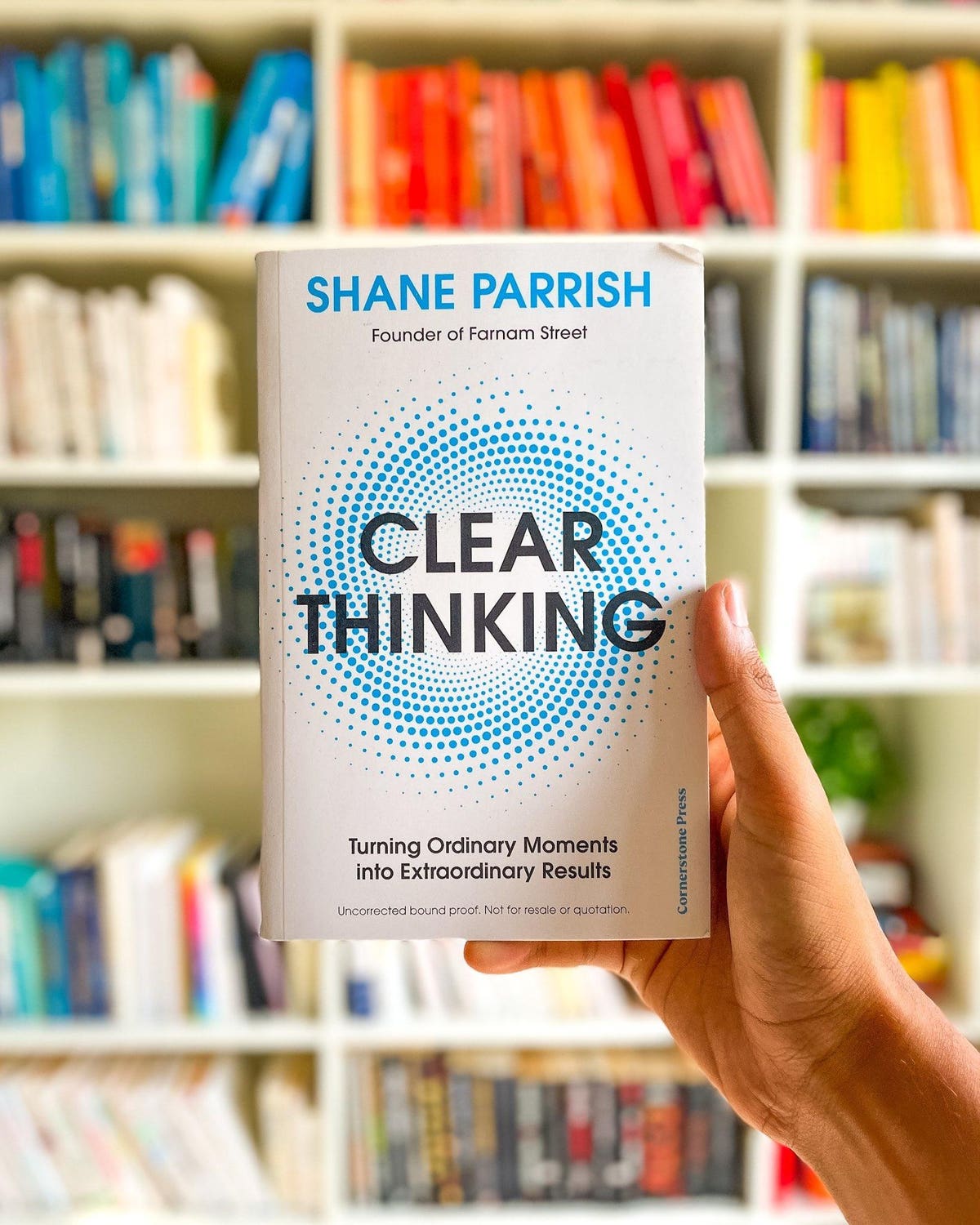Shane Parrish has an obsession with making good decisions. That has led him to study the greatest decision makers in history and talk to some of the best inventors, entrepreneurs and leaders of our time. He’s been blogging and podcasting about it for years. He has distilled all that wisdom into his new book Clear Thinking: Turning Ordinary Moments into Extraordinary Results.
I recently discussed the book with Mr. Parrish. The interview was condensed and edited for clarity. If you’re interested in viewing a video of the entire discussion, click here.
Kyle Westaway: I’m curious about the tagline of this book, which is about ordinary moments. So most people don’t talk a lot about ordinary moments. Why is that something that you’re focusing on, and why do “ordinary moments” matter? And what are ordinary moments?
Shane Parrish: Well, generally speaking, we get the big decisions sort of directionally correct. We think about who we’re going to marry, where we’re going to live, what career we’re going to go into. And the point is that we’re thinking about those moments so we tend to be a bit more rational than other moments.
But the ordinary moments have the ability to undo all of those smart choices. And we don’t realize that, in those ordinary moments, the situation is thinking for us.
If you have a partner at home, one of you probably loads the dishwasher one way, and the other one loads the dishwasher the other way. Just imagine Friday night. You’ve had a long week. You come home. Then, all of a sudden you’re arguing about the dishwasher. It just slowly escalates. It starts with a passive-aggressive comment. And then your partner does the same thing. Then, before you know it, you’re not talking to each other.
So the whole point is there’s a lot of moments and situations where we’re not thinking; the situation is thinking for us. And so those are ordinary moments. They have the ability to undo all of these big choices we make. You can pick the best partner. But if you don’t invest in that relationship, it’s going to multiply by zero. You’re going to wake up to divorce papers. You can pick the best career and the best company to work for, but if you don’t show up and work hard, you’re going to get fired. And so all these ordinary moments add up.
KW: Gotcha, I loved a point that you made in the book. You talk about one of the reasons why best performers make good decisions is because they’re not forced into bad decisions. What is the concept of “positioning” and how can it help us make clearer, better decisions?
SP: Yeah, so through studying some of the titans of decision making, I came to this conclusion that you don’t really need to be smarter than other people to outperform them — if you can outposition them. Anyone looks like a genius when they’re in a good position, and even the smartest people look like an idiot when they’re in a poor position.
Take, for example, Warren Buffett. He’s just never out of position. He’s got $150 billion on his balance sheet. If the stock market goes up, he wins. If it stays the same, he wins. If it tanks, he wins. He wins no matter what happens. He is a master of his circumstances rather than being mastered by them.
The people who build really amazing companies are playing offense when everybody else is forced into survival mode. If you look at Carnegie and Rockefeller, they did most of their expansion during panics and downturns, and they always had dry powder available because they realized they couldn’t predict the future and that unexpected things will happen. I mean, if history teaches us nothing, it is that. We can’t predict them, but we can position ourselves to prosper no matter what happens.
Where we often go wrong is when we’re forced by circumstance, forced by our emotions or our defaults, into doing something that we don’t want to do. And so how do the best people in the world operate? Well, they position themselves well, and they have great temperament. And so these two things combined allow them to think clearly and think independently.
KW: For better or for worse, I’m a productivity geek. And there was one phrase that jumped out at me that I’d love to hear you explain. It’s called the “ceiling of brute force.” What is it?
SP: The ceiling of brute force comes from a good friend of mine, Brent Beshore. And it’s when somebody is just the center of everything [and] has no leverage. If you think of operating a business, it’s like every decision goes through you. You micromanage everything. Everything flows through you. That might work for very small teams of five or six people, but there’s a ceiling at which that falls apart. And that often caps the potential of a business. If you can’t delegate, if you can’t trust, if you can’t hire people, if you can’t scale, if you can’t leverage your time, then all of a sudden you’re going to reach the ceiling of brute force. So there’s only so much effort, only so much energy you can put into things. It’s going to cap the performance of the business at a certain level, and you won’t be able to get beyond it.
KW: One of the things that I find that’s a paradox about this ceiling of brute force is that the thing that has made you successful to the point where you hit that ceiling is just working harder. You put in more hours than other people. You care more. You work harder. You get the bonuses, and you get the higher salary. If you’re owning the business, you see higher revenue. And then there’s a point at which the thing that has brought you here is holding you back from going forward.
SP: Yeah, we often think of working harder as the number of hours we’re working. But working harder can also be working smarter. If you can outsmart your competition, if you can outthink them, if you can leverage yourself, that’s a form of working harder.
We’re taught our whole life that the solution to every problem is to work harder, and that works. But that works for most situations, like school and when you’re working in a bigger organization. But when you start running a business, working harder has a ceiling to it. And that ceiling has never become apparent to you because you’ve been taught your whole life to put your head down and grind, and you’ll eventually get through it. There’s some truth to that. But when it comes to running a business, you have to leverage your time. You have to delegate decisions. You have to trust people. Otherwise, you’ll reach the ceiling of brute force.
KW: So many startups are pushed by their investors to prioritize growth at all costs. Can you talk us through the margin of safety and how you might think about that in the context of startups?
SP: I think about this differently, right? So I’ve started four different businesses at this point. I can only say it through my lens [but] my goal with all of those businesses was to get to break even as quickly as possible. I think Y Combinator calls it a ramen profitable. I never wanted to be dependent on the kindness of strangers or outside investors in order to determine my future.
If we are too dependent on that, we end up not recognizing when things don’t work. So we get a product and we sell it. It’s very inefficient because we have all this cash on the balance sheet; we can almost force sales. As an investor, I’ve seen a lot of companies that are spending more on marketing than they’re earning in sales. So every dollar of marketing is translating into something like $0.60 of sales. You can’t continue to do that, especially if you’re turning customers quickly.
If you’re letting investors determine what’s important to you, you’re letting them determine the scoreboard. If you’re running a business, you need to determine the scoreboard. Are you going to be profitable or are you going to grow as big as [you] can, as quick as [you] can? Founders need to consciously decide that.
My default is taking on low debt and being profitable. I don’t want external circumstances to wipe us out. First thing I want to do is survive. Second thing I want to do is take advantage of any fluctuations in the market.
KW: What does a typical day look like for you?
SP: I don’t take meetings in the morning. Every morning is blank until 12 because I want to be able to focus on the thing that’s most important to me, which usually is the biggest opportunity. I also want to spend time with my kids. I don’t want to be rushed, and I never want to have to find time to work on what’s important to me. My rule is that I just take meetings until 12. And then that way I never have to find time to do the most important thing on my agenda. I’m just a happier person with that schedule.
When I was working for the intelligence agency, I never had time to work on the things that were super important to me. All my time was usurped by other people. I was like, “How do I do the things that I really want to do that are very important but not urgent?”
So, I looked at my calendar three or four months in the future and then booked a 30-minute meeting with myself. I couldn’t do it sooner because I was so booked up until then.
And then three or four months came around. I’m like, now I’ve got a 30-minute block in my day to do the most important work. Then, I just slowly started expanding it over time. Eventually, I got to a 90-minute block every morning just for me. I wouldn’t use that to solve other people’s problems. I’d use it to work on long-term things that were super important to the organization that nobody ever really got the time to work on because we’re so busy, and we’re caught up in operations and day to day.
It’s the same as business owners, right? You’re so busy working in the business that you forget to work on the business. But if you have to find the time, you’re never going to find it. You really have to create the time for yourself, set it aside and make it untouchable.
We often just want to win the day, but we forget that we’re really in this game to win the decade.
KW: I have really enjoyed your writing on mental models. You introduced me to it, and I’ve been working my way through your books The Great Mental Models Volume 1, 2 and 3. If someone hasn’t heard of mental models, what are they? Why were you drawn to the concept?
SP: Mental models are simply a representation of how something works. It’s a distillation of an idea, concept. A mental model is a lens that tells you what’s valuable in a situation and what to ignore in a situation. And if you use the right lenses, then you see the reality for what it is. And if you use the wrong lenses, then you miss stuff.
We may have very good mental models in our field about how things work, but we forget the general mental models of life. The idea with the mental models books is to expose readers to the 101 class in university of almost every major discipline, as well as teaching them how those ideas apply to life. And so we included some mental models like second order thinking, inversion and entropy.
KW: I’m curious if you have some mental models that you would highlight for an entrepreneur, founder or an operator of a startup.
SP: So, we talked about positioning. We talked about margin of safety. Second order of thinking is a great one, which we didn’t talk about directly, but sort of relates to the investor question we had. If you’re being pressured by your investors, you take money. The question to ask yourself always is, “And then what?”
So if I take this particular course of action, now what? Now what does the world look like after that moment? And is that the world I want to operate in or are there things that we can do today to position ourselves so that we’re less affected by that?
A lot of things that we do are first order positive, second order negative. An example of which is eating a chocolate bar. You eat a chocolate bar, you get a dopamine rush and your insulin level spikes. You feel great. You get the sugar rush, the sugar high. Then second-order effect, it comes a little later. You get the crash.
The gym is an example of something for a first-order negative and second-order positive. I don’t like going to the gym. I don’t know about you. It’s not my favorite thing to do, but I do it. I do that because I want to be healthy. So the second-order benefit is that I’m healthier. Hopefully I can live a longer, healthier life. And I’m in a better position if I do get sick, which is inevitable. There’s the inevitable ups and downs of life. I’ll be in a better position so my immune system will be functioning better. I’ll withstand that storm a little better than I otherwise would have.
If you’re looking to start a business or you’re looking for areas to compete in, anything that’s first-order negative, second-order positive would be a great area to start applying that concept. Most people don’t want to do that stuff, [but] they can’t wait for the reward.
Read the full article here





